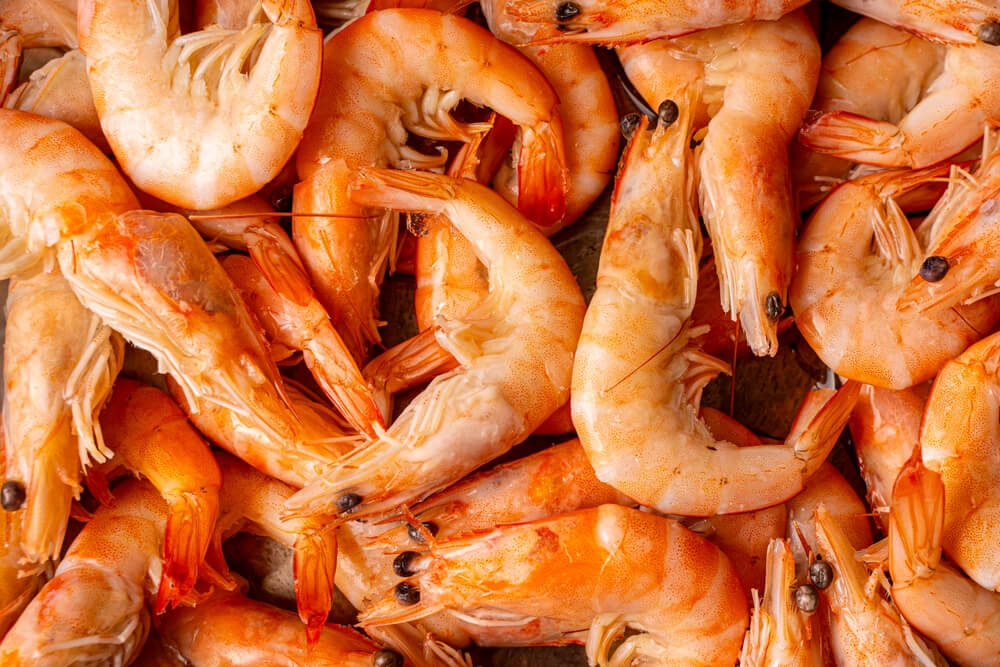Shrimp can be a nutritious treat for your dog when prepared correctly. It offers high protein, vitamin B12, and antioxidants. However, be aware of potential risks like allergies and digestive issues. This guide covers safe preparation, appropriate serving sizes, and alternative seafood options to ensure your dog’s health while enjoying these treats.
Understanding the Basics of Feeding Dogs Seafood
Feeding dogs seafood, particularly shrimp, is a topic that often piques the curiosity of pet owners. Understanding the basics of incorporating seafood into your dog’s diet is essential for ensuring their health and well-being.
First and foremost, can dogs eat shrimp? The answer is yes, but with some important considerations. Shrimp can be a nutritious addition to your dog’s diet when prepared properly. It is rich in protein, low in fat, and contains essential nutrients like vitamins B12 and D, niacin, and omega-3 fatty acids. These nutrients support various aspects of your dog’s health including their skin, coat, and overall energy levels.
However, it’s crucial to ensure that the shrimp is thoroughly cooked before feeding it to your dog. Raw or undercooked shrimp can harbor harmful bacteria such as Salmonella or Listeria which could lead to foodborne illnesses in dogs. Additionally, avoid seasoning or adding any spices to the shrimp as these can be harmful to dogs.
When introducing shrimp for dogs into their diet for the first time, start with small quantities to monitor for any adverse reactions or allergies. It’s also wise to consult with your veterinarian before making any significant changes to your pet’s diet.
While feeding dogs seafood like shrimp can offer nutritional benefits when done correctly and safely, it’s important always to prioritize their health by following proper preparation guidelines and consulting professionals when needed.
Nutritional Benefits of Shrimp for Dogs

Shrimp can be a delightful and nutritious treat for your canine companion, offering a variety of health benefits. Rich in essential nutrients, shrimp provides an excellent source of protein, which is crucial for muscle development and repair in dogs. Additionally, shrimp contains several vital vitamins and minerals such as vitamin B12, niacin (vitamin B3), phosphorus, and iodine.
Vitamin B12 plays a significant role in maintaining a healthy nervous system and supporting metabolic processes. Niacin aids in energy production and enzyme function, ensuring that your dog remains active and healthy. Phosphorus is essential for strong bones and teeth, while iodine supports proper thyroid function.
One of the key health benefits of shrimp is its low fat content combined with high protein levels, making it an ideal snack for dogs that need to maintain or lose weight without sacrificing nutritional value. Moreover, the antioxidants found in shrimp can help reduce inflammation and support overall immune health.
However, it’s important to prepare shrimp properly before offering it to your dog. Ensure that the shrimp is fully cooked and free from any shells or seasoning that could be harmful. Moderation is also key; while shrimp nutrients are beneficial for dogs, overfeeding can lead to digestive issues.
In conclusion, when served correctly and in moderation, shrimp can be an excellent addition to your dog’s diet due to its rich nutrient profile and numerous health benefits. Always consult with your veterinarian before introducing any new food into your pet’s diet to ensure it aligns with their specific health needs.
Potential Risks and Allergies Associated with Feeding Shrimp to Dogs
Feeding shrimp to dogs can be a delightful treat, but it’s essential to be aware of the potential risks and allergies that may arise. Shrimp allergies in dogs are not uncommon, and they can manifest through various symptoms such as itching, swelling, gastrointestinal upset, and even more severe reactions like anaphylaxis. Understanding these risks is crucial for pet owners who wish to introduce seafood into their dog’s diet.
One of the primary concerns with feeding shrimp to dogs is the risk of seafood allergies in pets. Just like humans, dogs can develop allergic reactions to certain proteins found in seafood. If your dog has never consumed shrimp before, it’s advisable to start with a small amount and monitor for any adverse reactions.
Additionally, there are potential dangers of shrimp beyond allergies. Shrimp can sometimes contain harmful bacteria or parasites if not cooked properly. Raw or undercooked shrimp pose significant health risks such as food poisoning or parasitic infections. Therefore, it’s imperative always to cook shrimp thoroughly before serving it to your dog.
Moreover, the high cholesterol content in shrimp could also be problematic for some dogs, particularly those with pre-existing health conditions like pancreatitis or obesity. Moderation is key; while occasional shrimp treats might be safe for many dogs, overindulgence could lead to health issues.
While feeding shrimp to your dog might seem harmless and even beneficial due to its nutritional value, it’s important first to consider the risks of feeding shrimp to dogs. Always consult with your veterinarian before introducing new foods into your pet’s diet and observe closely for any signs of allergic reactions or other health problems.
How to Safely Prepare Shrimp for Your Dog
When it comes to safely cooking shrimp for your dog, there are several important steps you should follow. First and foremost, always avoid raw shrimp for pets. Raw shrimp can carry harmful bacteria and parasites that could pose serious health risks to your canine companion. Instead, opt for thoroughly cooked shrimp.
Begin by cleaning the shrimp under cold running water to remove any potential contaminants. Next, peel off the shell and devein the shrimp to ensure it’s free from any digestive tract residue that might be harmful to your dog.
Cooking methods such as boiling or steaming are ideal because they preserve the nutritional value of the shrimp without adding unnecessary fats or oils. Make sure not to add any seasoning, as many spices and additives can be toxic to dogs. Once cooked, allow the shrimp to cool completely before offering it to your pet.
For a dog-friendly recipe, consider mixing chopped cooked shrimp with their regular food or incorporating it into homemade treats. This way, you can ensure that your canine friend enjoys a safe and tasty meal that is both nutritious and delicious.
By following these guidelines on safely cooking shrimp for dogs, you can provide a healthy treat while ensuring their well-being is never compromised.
Serving Size and Frequency
When it comes to feeding your dog shrimp, understanding the appropriate portion sizes and frequency is crucial for maintaining their health. Shrimp can be a nutritious treat for dogs, rich in protein and low in fat, but moderation is key.
Appropriate Portion Sizes of Shrimp for Dogs
The portion size of shrimp you can give your dog largely depends on their size and overall diet. For small dogs, one or two shrimps may suffice as an occasional treat. Medium-sized dogs might handle three to four shrimps, while larger breeds could enjoy up to five or six. It’s important to remove the shell, head, and tail before serving shrimp to avoid any choking hazards.
How Often Can My Dog Have Seafood Treats?
While shrimp can be a delightful snack for your canine companion, it should not become a staple in their diet. Seafood treats should be offered sparingly—once or twice a week at most. Overfeeding seafood can lead to imbalances in your dog’s diet and potential allergic reactions.
Moderation in Feeding Pets Seafood Snacks
As with any treat, moderation is essential when feeding your pet seafood snacks like shrimp. Excessive consumption of shrimp could lead to digestive issues such as diarrhea or vomiting due to its high cholesterol content. Always introduce new foods gradually into your pet’s diet and monitor them for any adverse reactions.
By adhering to these guidelines on serving size and frequency, you can safely incorporate shrimp into your dog’s diet as an occasional delight without compromising their health.
Safe Seafood Options Other Than Shrimp for Dogs
When considering shrimp alternatives for your canine companion, it’s essential to explore other safe seafood options that can be included in their diet. Fish alternatives to shrimp offer a variety of nutrients and health benefits that can enhance your dog’s overall well-being.
One excellent option is salmon. Rich in omega-3 fatty acids, salmon supports a healthy coat and skin while promoting joint health. It’s crucial to cook the salmon thoroughly and remove any bones before serving it to your dog.
Another viable choice is whitefish, such as cod or haddock. These types of fish are lean sources of protein and are generally low in fat, making them ideal for dogs with sensitive stomachs or those on weight management plans.
Sardines are also a fantastic alternative. Packed with essential vitamins like B12 and D, as well as omega-3 fatty acids, sardines can boost your dog’s immune system and support cardiovascular health. Opt for fresh sardines or those canned in water without added salt.
Lastly, consider incorporating mackerel into your dog’s diet. Mackerel provides a good balance of protein and healthy fats while being rich in antioxidants that help fight inflammation.
By exploring these fish alternatives to shrimp for canines, you can offer healthy marine treats that contribute positively to your dog’s diet without compromising their safety or nutritional needs. Always consult with your veterinarian before introducing new foods into your pet’s diet to ensure they are appropriate for their specific health requirements.
Should You Include Shrimp in Your Dog’s Diet?
When considering whether to include shrimp in your dog’s diet, it’s essential to weigh the benefits against the potential risks. Shrimp can be a healthy addition to your dog’s meals, providing valuable nutrients such as protein, vitamin B12, and omega-3 fatty acids. These nutrients support overall health, including muscle development, energy levels, and skin and coat condition.
However, it’s crucial to prepare shrimp properly before offering it to your dog. Always cook the shrimp thoroughly and remove any shells or tails to prevent choking hazards and digestive issues. Additionally, avoid seasoning or adding ingredients like garlic or onions that can be harmful to dogs.
While shrimp can be a nutritious treat for many dogs, it’s essential to introduce it gradually into their diet and monitor for any signs of allergies or adverse reactions. If you notice symptoms such as itching, swelling, vomiting, or diarrhea after feeding your dog shrimp, discontinue use immediately and consult with your veterinarian.
In summary, when prepared correctly and given in moderation, shrimp can be a beneficial supplement to your dog’s diet. As always with dietary changes or new treats for pets, consulting with a veterinarian is recommended to ensure it aligns with your dog’s specific health needs.






